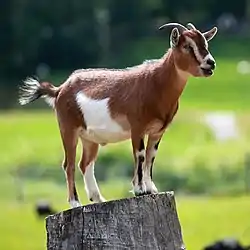やぎ
Japanese
Pronunciation
- Pitch accent is unknown for the surnames; for the willow sense, pitch accent depends on the compound word
Etymology 1
| Alternative spelling |
|---|
| 柳 |
From Old Japanese. First attested in the Man'yōshū of 759.[2]
Ultimate derivation unclear. Theories include:
- Shorter form of やなぎ (yanagi, “willow”), omitting the medial な (na).[2][1]
- From Middle Chinese 楊 (MC jɨɐŋ) + 木 (ki, “tree”).[2]
- From Middle Chinese 楊 (MC jɨɐŋ) + い (i, possible epenthesis; see also development of 銭 (zeni) from older sen), with resultant /jiaŋi/ realizing in Japanese phonology as yagi.[2][1]
Generally only found in compounds.
Further reading
- Entry at Nihon Jiten (in Japanese)
Etymology 2
| Alternative spellings |
|---|
| 山羊 野羊 (less common) |
Ultimate derivation unclear. Theories include:
- Shift from 野牛 (yagyū, “wild cattle”), from a vague resemblance between the two creatures.
- From Middle Chinese 羊 (MC jɨɐŋ) + い (i, possible epenthesis; see also development of 銭 (zeni) from older sen), with resultant /jiaŋi/ realizing in Japanese phonology as yagi.
Might only be attested in Japanese since 1523.[3]
The kanji spellings, either 山 (“mountain”) + 羊 (“sheep”) or 野 (“field; wild”) + 羊 (“sheep”), are examples of jukujikun (熟字訓).
Noun
やぎ or ヤギ • (yagi)
- [from 1523?] a goat (animal)
- 2000 April 20, “深き森の長老 (fukaki mori no chōrō) [Elder of the Deep Woods]”, in Magic Ruler -魔法の支配者-, Konami:
- 昔から森に住んでいる白ヤギ。真の姿は森の長老。
- Mukashi kara mori ni sundeiru shiroyagi. Shin no sugata wa Mori no Chōrō.
- A white goat who has dwelt in the woods since ancient times. Its true visage is as an Elder of the Woods.
- 昔から森に住んでいる白ヤギ。真の姿は森の長老。
-
Usage notes
As with many terms that name organisms, this term is often spelled in katakana, especially in biological contexts (where katakana is customary), as ヤギ.
Further reading
- Entry at Nihon Jiten (in Japanese)
Etymology 3
The reading of various names.
| For pronunciation and definitions of やぎ – see the following entries. | ||||
| ||||
| (This term, やぎ, is an alternative spelling of the above terms.) |
(The following entries are uncreated: 矢木, 八記, 八樹, 矢儀, 八代, 野寄, 矢樹, 屋木, 柳吉, 矢城, 八鬼, 谷木, 八城, 矢来, 箭木.)
References
- 2006, 大辞林 (Daijirin), Third Edition (in Japanese), Tōkyō: Sanseidō, →ISBN
- “柳”, in 日本国語大辞典 (Nihon Kokugo Daijiten, “Nihon Kokugo Daijiten”) (in Japanese), 2nd edition, Tōkyō: Shogakukan, 2000, →ISBN
- “山羊・野羊”, in 日本国語大辞典 (Nihon Kokugo Daijiten, “Nihon Kokugo Daijiten”) (in Japanese), 2nd edition, Tōkyō: Shogakukan, 2000, →ISBN
This article is issued from Wiktionary. The text is licensed under Creative Commons - Attribution - Sharealike. Additional terms may apply for the media files.
